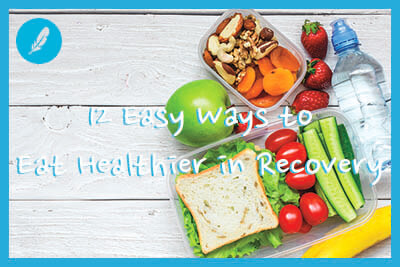Ready to Eat Healthy in Recovery? 12 Easy Ways to Eat Healthier Today
With the weather warming up, you may be tempted to ditch your 12-Step meetings or appointments with your doctor or recovery coach and head outside instead, but now more than ever, it is time to set yourself up for success in sobriety. With summer right around the corner, you want to make sure you have all the tools you need at your disposal to avoid relapse, and so often, that starts with making lifestyle choices that support an overall healthy life like eating healthfully.
The good news is that this process can happen right now, and it doesn’t take a huge amount of money, time, or effort to be effective. In fact, sometimes the littlest things can have the biggest impact. Here are a just a few ways you can start making healthier choices to support yourself in eating healthier in recovery right now:

1. Drink more water than you think you need. Healthy eating starts with drinking enough water to properly process and metabolize the food you eat, assist you in recognizing when you are truly full, and keep your energy levels high. Most people do not drink as much water as they should, so if you are looking for ways to get healthier through food, you can start by pouring yourself a glass of water.
2. Ditch the soda. No matter how you feel about water, if you tend to drink a lot of sodas (diet or regular), then an easy way to cut out inflammation and unwanted calories is to drop soda from your diet. Replace it instead with plain water and save some money at the same time, or find an herbal tea blend or fruit-infused water that helps you stay hydrated.
3. Pack your lunch for the entire week. If you are already making yourself a healthy lunch to bring with you one day, go ahead and make double – or make enough for the entire week. If you already have everything out or you are cooking, it is easier to make extra and prep it all at the same time than to repeat the process every day.
4. Make healthy dinners in advance, too. While you’re making lunch, go ahead and whip up some easy healthy dinners, too. Spending a couple hours in the kitchen making some basic healthy components that will last through the week (e.g., kale salad, rice, chicken, etc.) will ensure you always have a healthy dinner when you are hungry and likely to grab fast food if there are no healthy alternatives.
5. Give yourself a break. Nothing could be easier than simply choosing to stretch out the time between meals if you aren’t really that hungry. You do not have to eat based on the clock. Instead, eat when you are hungry.
6. Make a grocery list. If you are headed to the store, it is easy to grab the boxes that have pictures of food you would like to eat, but you will set yourself up for success in healthy eating if you buy ingredients rather than processed foods. Go in with a list to keep yourself on track.
7. Buy groceries with cash. It is easy to spend money you can’t see, but if you have only $20 when you stop by the store, you may be more inclined to buy only a few vegetables, a box of whole grain pasta, and a protein to make a few meals for yourself rather than splurge on pre-made items that are unhealthy.
8. Take it black. If you are a coffee or tea drinker and tend to fill half the cup with a chemical-filled creamer and/or five scoops of sugar, you’re not alone in recovery. Many people tend to overdo it on the sweets and inadvertently add hundreds of empty calories to their diet.
9. Make fruit your new dessert. It’s sweet, it’s tasty, and it’s far better for you than the easy-grab cookies or cakes that come in packages.
10. Fool the eye. If portion control is an issue for you, you can use smaller plates or tall glasses to help your smaller portions look more satisfying – a little psychological trick to help you stay on track!
11. Get some sleep. When you do not get enough sleep, you may subconsciously attempt to make up for the loss of energy by ingesting more calories, which can in turn make you tired, lower your energy levels, or disrupt your sleep further. Getting good sleep can help you to make healthier eating choices.
12. Stay focused on your recovery. Long-term recovery takes commitment to a range of healthy choices – not just healthy eating. If you are struggling with making any healthy choices at all, including eating well, it may be time to recalibrate what you are doing in therapy, address ongoing mental health issues, or more heavily engage in the recovery process in a way that is meaningful for you.
How will you start making healthy choices in recovery?
Does your insurance cover treatment for alcohol and/or drug addiction?
Check your insurance coverage or text us your questions to learn more about treatment by American Addiction Centers (AAC).